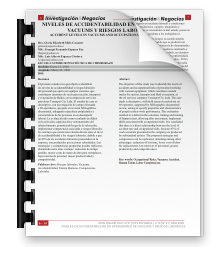La VALIDACIÃN DEL MODELO DE GESTIÃN SOSTENIBLE PARA EL DESARROLLOTURÃSTICO EN VINCULACIÃN UNIVERSIDAD - COMUNIDADES MANABITAS. ECUADOR
IntroducciÃģn, Importancia del Problema, MetodologÃa, Resultados, DiscusiÃģn, Conclusiones.
Resumen
El objetivo de esta investigaciÃģn es presentar los resultados de la validaciÃģn del modelo de gestiÃģn sostenible vinculado desde la Escuela Superior PolitÃĐcnica Agropecuaria de Manabà âManuel FÃĐlix LÃģpezâ para el desarrollo turÃstico de las comunidades de la provincia de Manabà en Ecuador. La investigaciÃģn presenta un anÃĄlisis del modelo propuesto por Doumet, Mendoza, & Garcia (2017) e integra otros procesos propuestos por Garcia (2017). Para verificar la aplicabilidad del modelo y validarlo se utilizÃģ el mÃĐtodo Delphi, utilizÃĄndose los procedimientos realizados por Aparicio (2013); Michalus, Sarache, & HernÃĄdez (2015) y Reguant-Ãlvarez & Torrado-Fonseca (2016) adaptÃĄndolo a las condiciones de esta investigaciÃģn, para seleccionar los expertos se evalÚo el Coeficiente de Competencia en funciÃģn del Coeficiente de Conocimiento o InformaciÃģn y el Coeficiente de ArgumentaciÃģn para cada experto. Se establecieron once indicadores en el instrumento de validaciÃģn del modelo y los resultados evidenciaron que la inmensa mayorÃa de las respuestas en las evaluaciones se ubican dentro de la clasificaciÃģn: muy de acuerdo o de acuerdo y que sobresalen los indicadores de contextualizaciÃģn, aplicabilidad, factibilidad e integridad del modelo de gestiÃģn sostenible propuesto. Se aplicÃģ ademÃĄs el Test del coeficiente W de Kendall para la determinaciÃģn del grado de asociaciÃģn entre los criterios emitidos por los expertos, los valores obtenidos condicionan rechazar la hipÃģtesis nula, por lo que el juicio de los expertos es consistente y concuerdan en la ponderaciÃģn de los indicadores calculados, comprobÃĄndose que la consistencia entre sus opiniones es fuerte con relaciÃģn al Modelo de gestiÃģn sostenible propuesto.
Palabras clave: Comunidad, MÃĐtodo Delphi, procesos universitarios, sostenibilidad.
Abstract
The objective of this research is to present the results of the validation of the sustainable management model linked from the Escuela Superior PolitÃĐcnica Agropecuaria de Manabà âManuel FÃĐlix LÃģpezâ for the tourism development of the communities of Manabà province in Ecuador. The research presents an analysis of the model proposed by Doumet, Mendoza, & Garcia (2017) and integrates other processes proposed by Garcia (2017). To verify the applicability of the model and validate it, the Delphi method was used, using the procedures performed by Aparicio (2013); Michalus, Sarache, & HernÃĄdez (2015) and Reguant-Ãlvarez & Torrado-Fonseca (2016) adapting it to the conditions of this research, to select the experts, the Competency Coefficient was evaluated according to the Knowledge or Information Coefficient and the Coefficient of Argumentation for each expert. Eleven indicators were established in the validation instrument of the model and the results showed that the vast majority of the responses in the evaluations are located within the classification: strongly agree or agree and that the indicators of contextualization, applicability, feasibility and integrity of the proposed sustainable management model. The Kendall W-coefficient test was also applied to determine the degree of association between the criteria issued by the experts. The values ââobtained condition the rejection of the null hypothesis, so the judgment of the experts is consistent and they agree on the weighting of the calculated indicators, verifying that the consistency between their opinions is strong in relation to the proposed Sustainable Management Model.
Keywords: Community, Delphi method, university processes, sustainability.

Derechos de Autor
La revista âInvestigaciÃģn & Negociosâ reconoce y respeta los derechos patrimoniales y morales sin restricciÃģn alguna.
Descargo de Responsabilidades
El contenido de los artÃculos publicados en la Revista âInvestigaciÃģn & Negociosâ es de absoluta responsabilidad de sus autores.
Costos de publicaciÃģn de artÃculos
El proceso de publicaciÃģn y presentaciÃģn de artÃculos para la Revista âInvestigaciÃģn & Negociosâ no tiene ningÚn costo para los autores.




